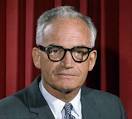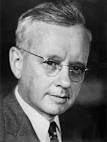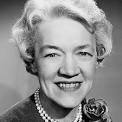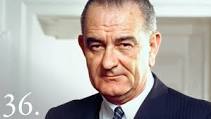
Barry Goldwater was a controversial and unpopular Republican presidential nominee. When Goldwater ran for president in 1964, it was the first time Vermont didn’t support the Republican presidential candidate since 1856.
From before the Civil War until after the Civil Rights Act, Vermont was staunchly Republican. Founded on the principles of abolition, temperance and women’s suffrage, Vermont’s Republican Party dominated state politics for more than a century. During that time, Vermonters elected only Republicans to statewide office.

From 1856 to 1960, Vermont always voted for the Republican presidential nominee. Even in 1936, Vermont was one of only two states that voted for Republican Alf Landon when the rest of the country returned FDR to his second term in a landslide.
For twenty-seven consecutive presidential cycles, Vermont always chose the Republican candidate. But Vermont broke rank with the GOP in 1964, when Barry Goldwater ran against LBJ.
During the primaries, conservative Barry Goldwater and moderate Nelson Rockefeller led a crowded field of presidential hopefuls. Many feared Goldwater was too conservative to win a national election and too hawkish to be trusted with the nuclear trigger if he did.

The voters who preferred Rockefeller’s more moderate politics were nevertheless scandalized by his recent divorce and swift marriage to his already pregnant new wife. There was still no clear winner when the convention opened in San Francisco in mid-July.
Vermont’s Republican Senator George Aiken was in the fourth of his five terms in the Senate, where he supported federal programs like food stamps, rural electrification and crop insurance. By all accounts, he was an esteemed member of the Senate, and a moderate one.
Aiken opposed both Barry Goldwater and Nelson Rockefeller. He didn’t even support the attempt to draft Pennsylvania Governor William Scranton. Instead, he nominated his colleague from Maine,

Senator Margaret Chase Smith, claiming she “was the best qualified person you ever voted for.”
But Smith didn’t win the nomination. Goldwater did.
Goldwater’s nomination put Vermont’s Republican voters in a tough spot: they didn’t support Goldwater, but couldn’t bring themselves to vote for a Democrat. Thanks to the newly created Vermont Independent Party, they didn’t have to.
The Vermont Independent Party put LBJ at the top of their ticket, allowing Vermonters to vote for him without technically voting for a Democrat.

LBJ won in all fourteen counties with a statewide majority of sixty-six percent.
A version of this essay was broadcast on the stations of Vermont Public Radio.
Have an Essay Every Wednesday emailed directly to your inbox – just subscribe. It’s easy: enter your email in the subscription box and then confirm your subscription. It’s entertaining, educational, and it’s free.
Nice to get this perspective on Vermont voting history. Glad to be led into your reading your writing again!
Thanks for subscribing!